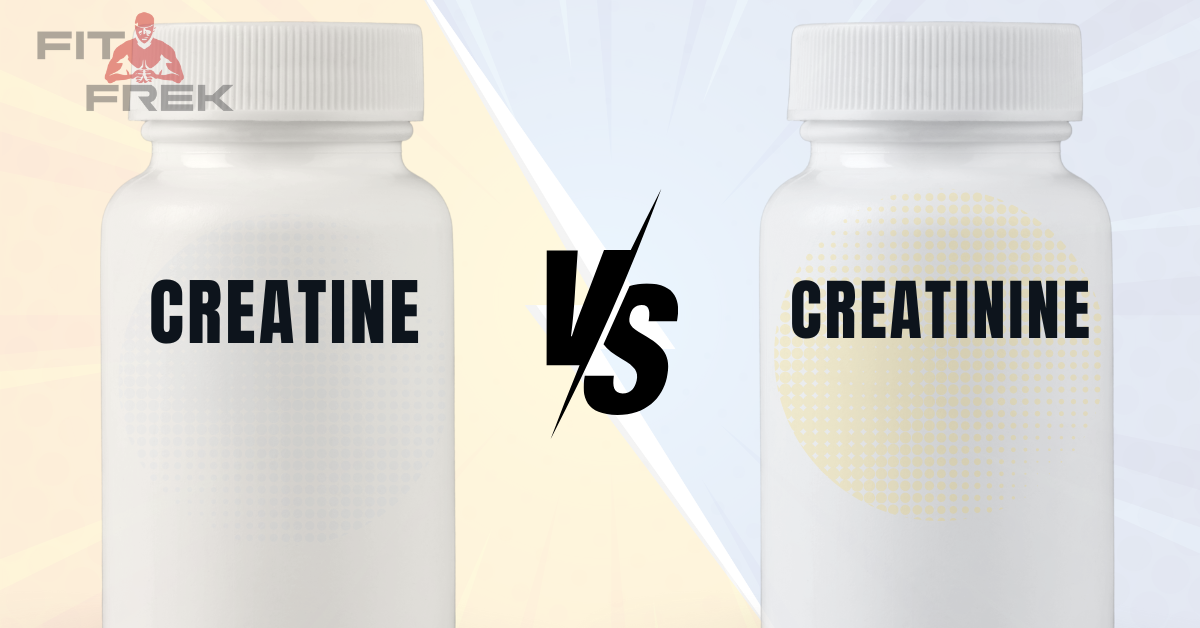
Creatine and creatinine are two compounds that are often mentioned in the context of muscle health and athletic performance.
While they may sound similar, they have different bodily roles associated with different health implications.
This article aims to provide a comprehensive comparison between creatine and creatinine, discussing their functions, benefits, and potential drawbacks.
Creatine is a naturally occurring amino acid found primarily in muscle cells.
It is crucial in energy production, particularly during high-intensity exercise or heavy lifting.
Creatine is also available as a dietary supplement, popular among athletes and bodybuilders for its potential to improve strength and lean muscle mass.
On the other hand, Creatinine is a waste product produced from the normal wear and tear of muscles.
It's generated from creatine and is usually eliminated from the body through the kidneys.
High levels of creatinine in the blood can be an indicator of kidney disease.

Creatine is synthesized in the liver, kidneys, and pancreas and transported to the muscles through the bloodstream.
Once it reaches the muscles, it's converted into phosphocreatine, stored energy.
During intense physical activity, phosphocreatine is converted back into creatine, releasing energy.
Research shows that creatine supplementation can increase muscle creatine and phosphocreatine concentrations by up to 40%, enhancing the body's capacity to perform high-intensity work.
It can also accelerate the recovery of these energy stores between bouts of high-intensity exercise.
Recommended: Best Creatine HCL Supplements
Creatinine is formed from the breakdown of creatine in the muscles.
It's released into the bloodstream and is usually filtered out by the kidneys and eliminated in the urine.
The level of creatinine in the blood is often used as a marker of kidney function.
A high blood creatinine level may indicate that the kidneys aren't working properly.
Creatine and creatinine are related to muscle metabolism but serve different functions.
Creatine is involved in energy production, while creatinine is a waste product that needs to be eliminated from the body.
The main similarities between creatine and creatinine are that they are both produced in the body and are related to muscle metabolism.
They are also nitrogen-containing compounds, and their levels can be influenced by muscle mass, physical activity, and diet.
The differences between creatine and creatinine lie in their roles in the body and their health implications.
Creatine is a beneficial compound that helps to provide energy to the muscles and can be supplemented to enhance athletic performance.
On the other hand, Creatinine is a waste product that needs to be eliminated from the body, and high levels can indicate kidney disease.

Creatine is the compound that is commonly used as a dietary supplement.
Athletes and bodybuilders often take it to enhance muscle strength and size, improve exercise performance, and speed up muscle recovery.
Creatinine is not used as a supplement.
It's a waste product produced from the breakdown of creatine in the muscles.
High creatinine levels in the blood can be a sign of kidney disease.
See: Best Pre-Workouts with Creatine
The main difference between creatine and creatinine lies in their roles in the body.
Creatine is involved in energy production in the muscles, while creatinine is a waste product produced from the breakdown of creatine.
Creatine is beneficial for muscle function and can be supplemented to enhance athletic performance, while high creatinine levels can indicate a problem with kidney function.
Creatine is a compound that's known to improve strength and performance.
Research shows that creatine supplementation can enhance muscle strength, increase lean body mass, and improve performance in high-intensity exercise.
Creatinine, on the other hand, does not have performance-enhancing effects.
It's a waste product eliminated from the body through the kidneys.
From a health and performance perspective, creatine is generally considered the "better" compound.
It plays a crucial role in energy production, can enhance athletic performance, and has been associated with other health benefits, such as neuroprotective effects.
On the other hand, Creatinine is a waste product that needs to be eliminated from the body
While it's a normal part of muscle metabolism, high creatinine levels in the blood can be a sign of kidney disease.
What is creatine?
Creatine is a naturally occurring amino acid found primarily in muscle cells. It is crucial in energy production, particularly during high-intensity exercise or heavy lifting. Creatine is also available as a dietary supplement, popular among athletes and bodybuilders for its potential to improve strength and lean muscle mass.
What is creatinine?
Creatinine is a waste product produced from muscles' normal wear and tear. It's generated from creatine and is usually eliminated from the body through the kidneys. High levels of creatinine in the blood can indicate kidney disease.
Can creatine supplementation increase creatinine levels?
Yes, creatine supplementation can temporarily increase creatinine levels because creatinine is a breakdown product of creatine. However, this is usually not a cause for concern unless creatinine levels remain elevated even after stopping creatine supplementation.
Is creatine safe to use?
Yes, creatine is generally safe for most people when taken at recommended doses. However, it's always a good idea to talk to your doctor before starting any new supplement regimen, especially if you have any pre-existing medical conditions.
Can high creatinine levels be dangerous?
High creatinine levels can indicate kidney disease or other health problems. If you have high creatinine levels, seeking medical advice to determine the underlying cause is essential.
Does creatine cause kidney damage?
No conclusive evidence suggests that creatine supplementation causes kidney damage in healthy individuals. However, people with pre-existing kidney conditions should avoid creatine supplementation.
Can I take creatine if I'm trying to lose weight?
Creatine can help increase muscle mass; muscles burn more calories than fat, even at rest. So, while creatine itself doesn't burn fat, it can indirectly contribute to fat loss by increasing muscle mass.
What are the benefits of creatine supplementation?
Creatine supplementation can enhance muscle strength, increase lean body mass, and improve performance in high-intensity exercise. Some research also suggests that creatine may have neuroprotective effects.
How much creatine should I take?
The recommended dosage of creatine can vary depending on your body weight and the specific goals you have. However, a common dosage strategy is taking a "loading dose" of 20-25 grams per day for the first week, followed by a "maintenance dose" of 5 grams daily.
Can I take creatine and creatinine together?
Creatinine is a waste product of creatine and is not used as a supplement. It's produced naturally in the body and is eliminated through the kidneys. There's no need to take creatinine as a supplement, which could potentially be harmful.
In conclusion, while creatine and creatinine may sound similar, they have different bodily roles.
Creatine is a beneficial compound that's involved in energy production and can enhance athletic performance.
On the other hand, creatinine is a waste product that needs to be eliminated from the body.
High creatinine levels in the blood can be a sign of kidney disease.
Useful Links
 About FitFrek
About FitFrekFitFrek operates as an independent platform, offering comprehensive workouts, programs, routines, guides, and unbiased reviews to accelerate your progress. We pride ourselves on our honesty, delivering straightforward and candid insights. FitFrek does not offer medical advice, diagnosis, or treatment services.